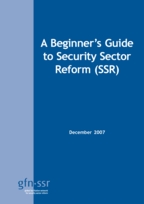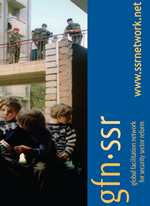
-
SSR in challenging environments
-
To Defeat Terrorism Pakistan Police Needs Reforms
-
Gaps in Pakistani Security Capabilities
-
Useful links for SSR in Pakistan
-
GFN-SSR Document Library
SSR in challenging environments:
Counter-terrorism and SSR in Pakistan
On the 19th March 2009, GFN-SSR hosted a seminar on Counter Terrorism and Security Sector Reforms in Pakistan at the UK Department for International Development (DFID). A summary of the event and articles from two of the speakers are given below.
The event was chaired by Prof. Stuart Croft of Warwick University with three guest speakers:
- Ayesha Siddiqa spoke on structural reforms and civilian military interactions
- Joshua T. White spoke on changes in security environment of frontier areas
- Hassan Abbas spoke on police and intelligence reforms and the nature of new US administration policies towards Pakistan.
Ayesha noted that despite improvements in civilian involvement in Pakistani politics, the military still holds a dominant position in the political system. She attributed this to structural flaws in the political system. The military has gained an ascribed status of being the country’s most powerful institution, mustering both economic and social power. Ayesha argued that the political system is weak due to bureaucratic political parties being dominated by the minority elite. The government has failed to establish civilian institutions, and to control the military the Ministry of Defence should be strengthened. Finally she indicated the emergence of Jihadism and its movements with possible ties to the military will make security sector reforms in Pakistan a daunting task.
Joshua focused mainly on the security environment in the frontier, civil-military relationships, and the type of security assistance that can be offered in such areas. In this scenario he observed three trends: consolidation of Islamic groups; the fragmentation of the Taliban; and the expansion of militant influence. There is a need to find mechanisms to resolve counter-terrorism and insurgency issues, grievances and deal with those who use the Taliban logo to engage in criminal activities. He indicated the importance of strengthening the local police force and government, along with the establishment of a rapid response police force and a stabilisation force with the ability to hold territory.
Hassan argued that the police and intelligence services of Pakistan have been continuously intimidated by fundamentalist groups. The police has been continuously used for political manipulation and it has no capacity for systematic data collection and dissemination which is critical for its work. The government has failed to allocate necessary funds required for these needs. As for the intelligence service, military influence along with political manipulation has become a major problem. Hassan emphasised the importance of looking at establishing a strong civilian administrative structure and development agenda as the way forward for Pakistani security sector reforms.
Articles written by external parties for ssrbulletin do not necessarily represent the views of GFN-SSR.
To Defeat Terrorism Pakistan Police Needs Reforms
It is a globally recognised fact that a state’s police and law enforcement agencies play a critical role as the first line of defence against the threats of terrorism and insurgencies. The informative 2008 RAND study How Terrorist Groups End provides evidence that effective police and intelligence work, rather than the use of military force, deliver better counterterrorism results. Based on this conclusion, the report suggested to US policymakers that they stop using the phrase ‘war on terror’, because there is no battlefield solution to defeating terrorists. Another valuable study analysing the police role in counterinsurgency campaigns in Malaya and Cyprus concluded that nearly all major twentieth-century counterinsurgency campaigns relied heavily on indigenous police as well as military forces. (James S. Corum, “Training Indigenous Forces in Counterinsurgency: A Tale of Two Insurgencies”, Strategic Studies Institute, March 2006)
The police infrastructure is one of Pakistan’s most poorly managed organisations. It is aptly described by many Pakistan experts as ill-equipped, poorly trained, deeply politicised, and chronically corrupt. It has performed well in certain operations; overall, however, that is a rare phenomenon. Arguably, the primary reason for this state of affairs is the government’s persistent failure to invest in law enforcement reform and modernisation. It is ironic that despite frequent internal crises since its inception in 1947, ranging from ethnic confrontations and sectarian battles to a sharp rise in criminal activity and growing insurgencies, both political and military policymakers have never given this sector top priority. Hence, poor police performance in counterterrorism and counterinsurgency is not surprising. The fact that the police successfully challenged some militant religious groups in Punjab in the late 1990s, and tackled an insurgency-like situation in Karachi in the early 1990s, shows that they do have the potential to deliver the desired results when political support is present and resources are provided. Clearly, better policing standards and performance will add to the government’s credibility and establish its writ more effectively in areas that are currently slipping out of its hands. Learning lessons from what transpired in the North West Frontier Province in recent years especially in order to plan for any pre-emptive law enforcement actions in South Punjab, where banned local militant groups including Sipah-e-Sahaba and Jaish-e-Mohammad are resurgent, is the need of the hour.
The internal threat to Pakistan today from extremists is more severe than anything Pakistan has witnessed in 60 years of existence (perhaps with the exception of civil war in East Pakistan 1969-1971, now Bangladesh). Surprisingly, from 2002-2008, only the thinnest slice of Western funds for Pakistan went to policing. More specifically, in 2007 for instance, the US allocated $731 million to help the country’s military and only $4.9 million for its police. Today, international support for police reform in Pakistan to enhance its law enforcement and counterinsurgency capacities is a must. The Obama administration’s proposed $1.5 billion annual aid package for Pakistan for the next five years must also include sufficient resources for this sector.
Hassan Abbas is a Research Fellow at the Belfer Center of the John F. Kennedy School of Government, Harvard University. Dr Abbas works on the Center’s Managing the Atom and International Security Programme. His research interests are Pakistan’s nuclear programme and the Dr. Abdul Qadeer Khan controversy; religious extremism in South and Central Asia, and “Islam and the West”.
This presentation will be incorporated into a policy report on the subject to be published by www.ispu.org in April 2009.
Gaps in Pakistani Security Capabilities
The Pakistani government is facing a tremendous array of internal threats on its frontier, a region comprising both the Federally Administered Tribal Areas (FATA) and the North-West Frontier Province (NWFP). In these areas, the Pakistani military has confronted Taliban and Taliban-like groups which have sought to displace state authority, and set up parallel legal and security services. In the process of confronting this rising militancy, three gaps in the Pakistani security capabilities have become apparent.
First, the government has demonstrated a consistently poor track record in coordinating civilian and military responses to Taliban expansion. In particular, the government often fails to escalate its security response as a threat grows in a specific region. For example, after the Taliban overwhelm police stations in a given locality, the government often waits far too long to mobilise paramilitary or military units. The recent creation of Regional Coordination Officers (RCOs) should improve the state’s ability to carry out a graduated response, but much stronger formal coordination is needed between RCOs and the Pakistani military.
Second, it has become clear that the government is very much in need of police or paramilitary units which can conduct stabilisation operations. The Pakistani army can ‘clear’ a great deal of territory in the frontier with relative ease, but has great trouble holding that territory after it returns to its barracks. In many parts of the frontier, the army does not have the legitimacy to remain
forward-deployed, and needs to rely on police or paramilitary units to secure territory over the mid-term and bring security to the population. The recent operations in Swat, Bajaur, and Mohmand in many ways reinforce this point: unless a force such as the Frontier Corps can remain to hold territory in the wake of the cessation of military operations, and can pave the way for the restoration of the government’s writ, the military operations are not likely to be useful over the long term.
Third, the slow but steady spread of Taliban influence in the frontier suggests that the government (and its international partners) need to develop a much more robust strategy of containment in order to prevent the Taliban from gaining wider and wider spheres of territorial influence in northern Pakistan. Unfortunately, many of Pakistan’s elite police and paramilitary units are focused on counterterrorism objectives, or on VIP protection, and are not trained or equipped to contain Taliban advances. If, for example, the government raised specially trained police or Frontier Corps units which provided a
rapid-response capability, such forces could be used to support local communities which were particularly vulnerable to creeping Talibanization. In an environment in which many local communities acquiesce to the Taliban out of fear rather than sympathy, a credible rapid response force could encourage local communities (or even ad hoc lashkars) to push back against militant advances.
In spite of widespread claims that the Taliban and such groups are nothing more than instruments of the Pakistani state itself, the truth is that the government has a real and ongoing interest in being able to confront and contain Islamist militant groups which challenge legitimate state authority. If it is to do so, particularly in the frontier, it will need to train and equip units which can perform specific which complement both local government and police activities, and also large-scale military operations of the kind recently carried out in the NWFP and FATA.
Josh White is a Research Fellow with the Center on Faith & International Affairs at the Institute for Global Engagement and a Ph.D. candidate at The Johns Hopkins University School of Advanced International Studies (SAIS) in Washington. His research focuses on Islamic politics and political stability in South Asia, and he has travelled extensively in Pakistan’s frontier areas.
Useful links for Pakistan
- BBC Country Profile
- NATO
- UNDP Pakistan
- Pakistan Ministry of Law & Justice
- Pakistan Ministry of Defence
- Islamabad Policy Research Institute (IPRI)
- Institute for Strategic Studies in Islamabad [ISSI]
- Quaid-i-Azam University – Department of Defence and Strategic Studies
- International Crisis Group
- Pakistan Security Research Unit (PSRU)
GFN-SSR Document Library
The Document Library contains links to a number of SSR related documents either focussing specifically on SSR in Pakistan looking at the country alongside others as a case study. A selection of these are listed below:
- Reforming Pakistan’s Police
Pakistan’s police force is incapable of combating crime, upholding the law or protecting citizens and the state against militant violence. This research from International Crisis Group argues that it is vital for the newly elected government to institute police reforms. Elected representatives will be held accountable if citizens continue to see the police as brutal and corrupt. The democratic transition could falter if deteriorating security gives the military a new opportunity to intervene. Major reforms and reallocation of resources are required to create an effective and accountable police service. - Reforming the Judiciary in Pakistan
How has Pakistan’s judiciary contributed to the preservation or undermining of the rule of law? What steps must Pakistan’s democratic leadership take to uphold constitutional government and respect for fundamental rights? This report from the International Crisis Group examines the role of Pakistan’s judiciary in upholding fundamental rights, the rule of law and the constitution. It argues that the judiciary has failed to uphold the constitution and to oppose Islamic legislation that violates fundamental rights. Pakistan’s return to civilian government provides an opportunity to restore the rule of law and repeal discriminatory laws that undermine fundamental rights and fuel extremism. - National Governance of Nuclear Weapons: Opportunities and Constraints
How accountable are nuclear weapons controls? This policy paper adopts a broad, governance focussed perspective and examines the spectrum of political oversight and control mechanisms that may apply within and between nuclear weapon states. It explores the roles and requirements of the state executive, the military, specialised civilian institutions, parliamentary institutions and civil society. It draws on notions of civilian control and democratic accountability, which have been established in the context of efforts for security sector reform. - All Along the Watch Tower: Bringing Peace to the Afghanistan Pakistan Border
Given increasing insurgency and intractable political discontent along the Afghanistan-Pakistan border, there is growing concern about the rationale and tactics of international stabilisation efforts in the region. This paper, by Peter Middlebrook and Sharon Miller, discusses the political history of the Afghan-Pakistan border region and current international stabilisation initiatives. Without a border settlement plan and reconciliation of border factions, international operations will not create a stable axis of political, military and economic consensus among Afghanistan, Pakistan and India. - Law and Policy Reform in Asia and the Pacific: Ensuring Voice, Opportunity and Justice
How has the Asian Development Bank (ADB) helped its developing member countries (DMCs) in Asia and the Pacific to undertake legal reforms? This paper from the ADB outlines initiatives adopted to reform legislative, institutional and judicial structures, raise awareness of individuals’ legal rights and strengthen government capacity. It argues that law reform is a central component in reducing poverty, promoting growth and empowering marginalised groups. - Training of Judges: Reflections on Principle and International Practice
What lessons can be learned from international experience in judicial education? What are the essential elements in planning successful judicial training programmes? This article by the Centre for Judicial Studies, Australia, analyses case studies in Australia, Mongolia, Pakistan, the Philippines and the UK. - Small Arms and Human Insecurity: Reviewing Participatory Research in South Asia
Does participatory research provide added value in identifying qualitative aspects of small arms-related insecurity? What impacts have communities in South Asia experienced as a result of the availability and use of small arms? This report from the Regional Centre for Strategic Studies (RCSS) and the Small Arms Survey (SAS) presents findings from a project using participatory approaches to measure small arms’ impacts in South Asia. Participatory approaches reveal that prolonged exposure to armed violence has affected livelihoods in South Asia in several short- and long-term ways.









